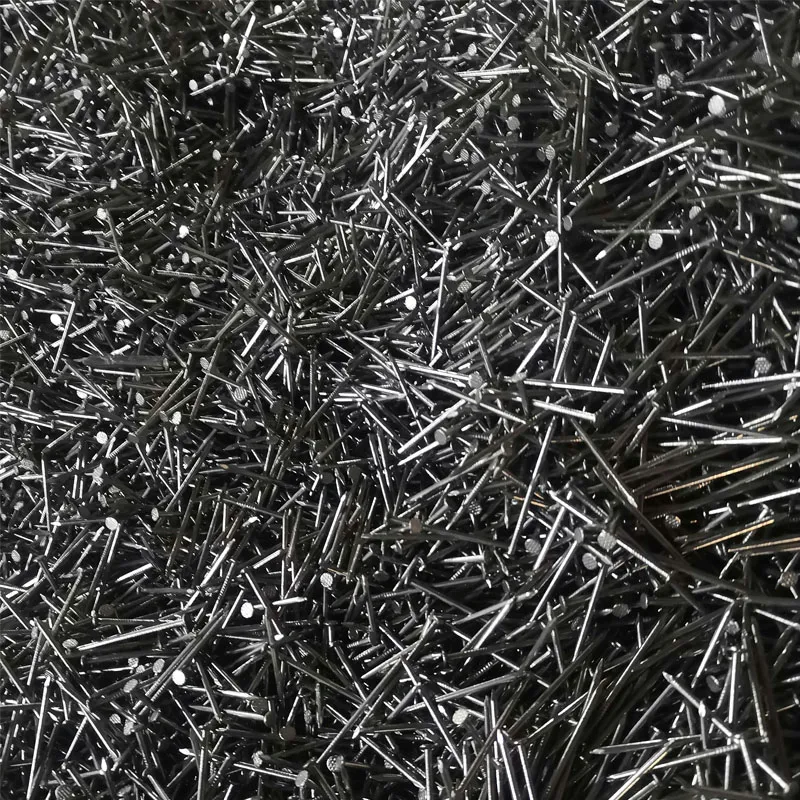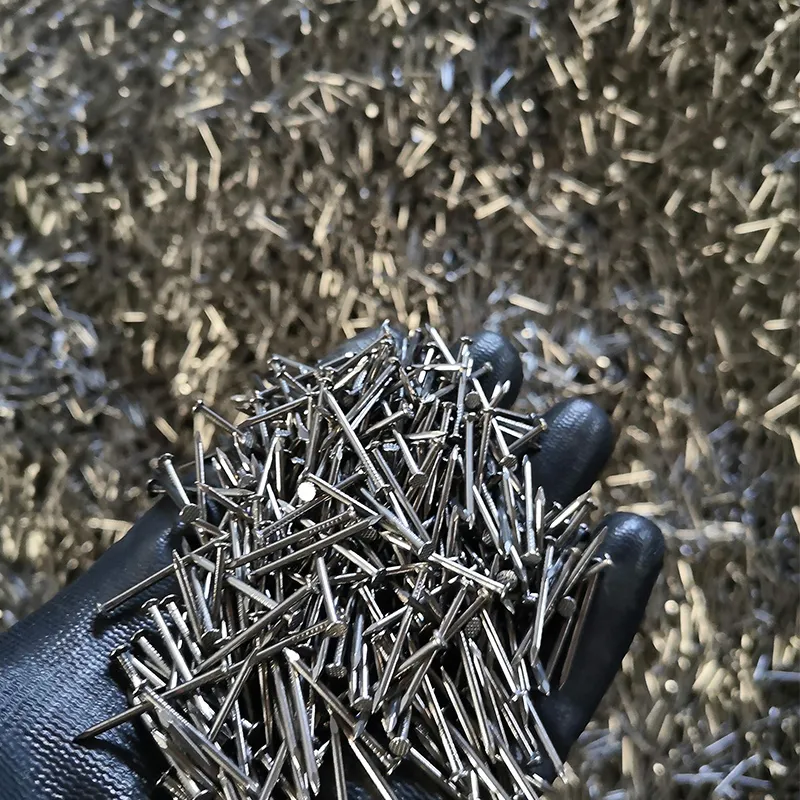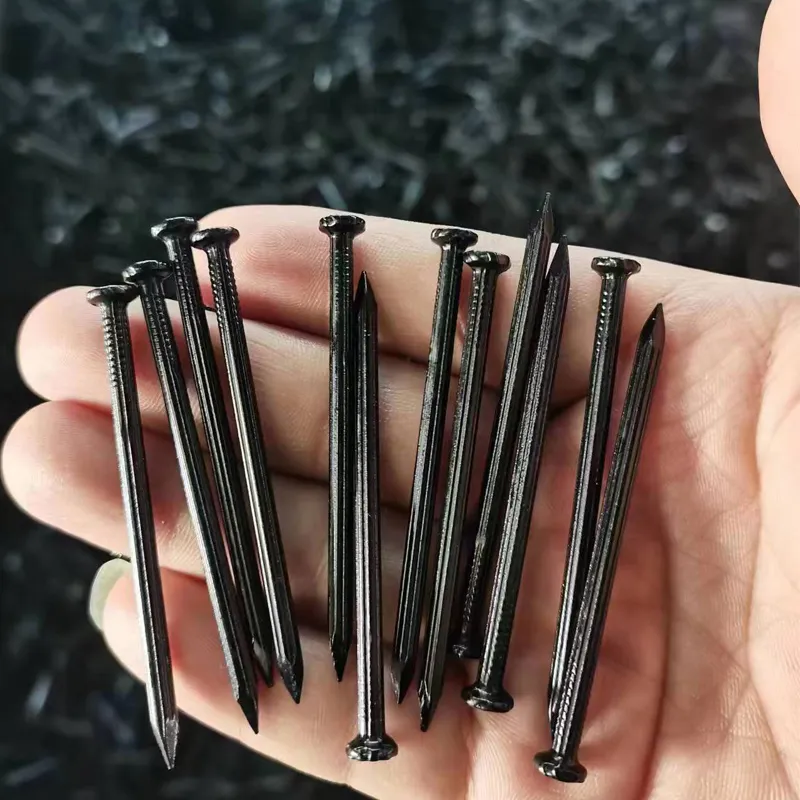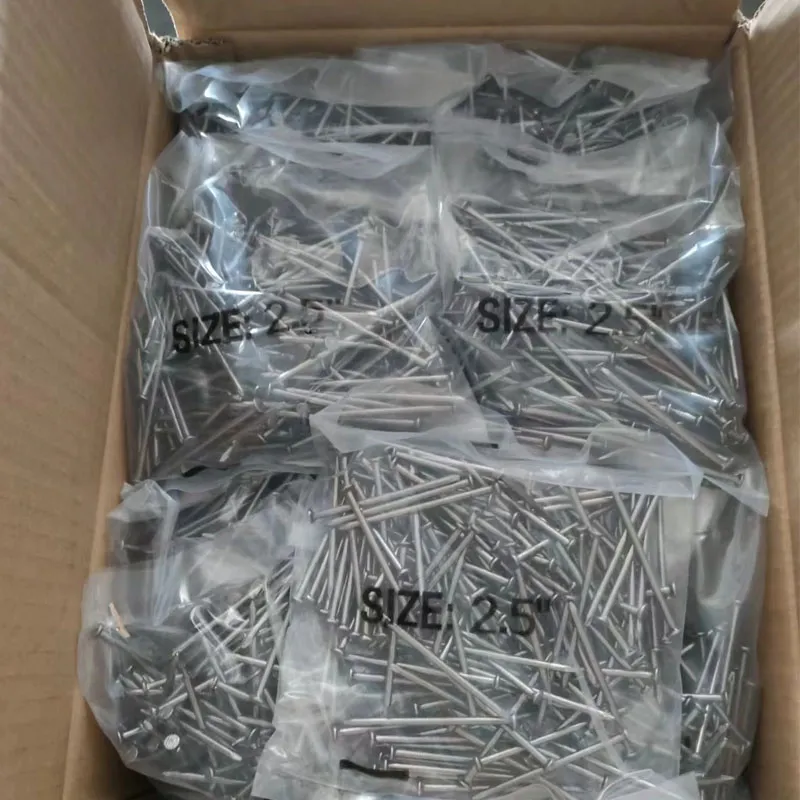Aug . 06, 2025 06:40 Back to list
Top Common Nail Factory | Quality Construction & Building Nails
In the world of construction and manufacturing, the humble nail is an unsung hero. From framing massive structures to delicate woodworking, the quality of these small fasteners can determine the integrity and longevity of a project. This guide provides an in-depth exploration of the modern common nail factory, delving into industry trends, manufacturing excellence, technical specifications, and how to select the right partner for your supply of high-quality construction nails and building nails.
Industry Trends: The Evolving Landscape of Nail Manufacturing
The global industrial fasteners market is projected to grow significantly, driven by a booming construction sector and increasing automation in manufacturing. For a common nail factory, staying ahead means embracing these trends. Key shifts include a move towards sustainable materials, stricter quality control standards like ISO 9001, and the adoption of advanced manufacturing technologies for higher precision and efficiency. The demand for specialized building nails, such as those with enhanced anti-corrosion properties, is also on the rise, particularly in regions with harsh environmental conditions.
Global Demand for Construction Nails (Projected Growth)
*Chart represents illustrative market growth rate (CAGR) based on industry analysis.
The Heart of Production: A Look Inside a Modern Common Nail Factory
Understanding the manufacturing process is crucial to appreciating the quality of the final product. At Yisze Wire Mesh, our process is a symphony of precision engineering and rigorous quality control, ensuring every common nail meets and exceeds industry standards. We don't just produce nails; we engineer fastening solutions.

The Meticulous Manufacturing Journey of a Common Nail
From raw material to finished product, each step is optimized for strength, durability, and consistency. Our commitment to excellence is evident in our adherence to international standards like ISO 9001 and ANSI specifications.
1. Wire Drawing
High-quality low-carbon steel coils (Q195, Q235) are drawn through a series of dies to achieve the precise shank diameter required for each nail size.
2. Nail Making
The drawn wire is fed into high-speed nail-making machines, which cut the wire to length, form the head, and create the diamond point in a single, automated operation.
3. Polishing & Coating
Nails are tumbled in polishing barrels to remove burrs and achieve a smooth, bright finish. For enhanced durability, they undergo galvanization (Electro or Hot-Dipped).
4. Quality Inspection
A crucial step where samples are tested for tensile strength, dimensional accuracy (length, diameter), and coating thickness, ensuring compliance with standards like ASTM F1667.
5. Packaging
Finished nails are weighed, counted, and packaged in secure boxes or bags, clearly labeled with specifications for easy identification and deployment on job sites.
Technical Specifications: The Data That Defines Quality
Not all construction nails are created equal. The performance of a nail is defined by its physical and material properties. A reliable common nail factory provides clear, verifiable technical data for its products. Below is a standard specification chart for common nails, showcasing the precision we adhere to.
| Penny Size (d) | Length (Inches) | Gauge | Shank Diameter (Inches) | Head Diameter (Inches) | Approx. Nails per Lb |
|---|---|---|---|---|---|
| 2d | 1 | 15 | 0.072 | 0.188 | 876 |
| 4d | 1 1/2 | 12.5 | 0.099 | 0.250 | 316 |
| 6d | 2 | 11.5 | 0.113 | 0.266 | 181 |
| 8d | 2 1/2 | 10.25 | 0.131 | 0.281 | 106 |
| 10d | 3 | 9 | 0.148 | 0.312 | 69 |
| 16d | 3 1/2 | 8 | 0.165 | 0.344 | 49 |
| 20d | 4 | 6 | 0.192 | 0.375 | 31 |
| 60d | 6 | 2 | 0.263 | 0.438 | 11 |

Technical Advantages & Material Science
The choice of material and manufacturing process directly impacts the nail's performance. Our focus on superior raw materials and advanced processing techniques gives our products a distinct advantage in the market.
Superior Material: Q235 Low-Carbon Steel
We primarily use Q235 steel, which offers an optimal balance of strength and ductility. Its typical tensile strength of 370-500 MPa ensures high shear resistance, preventing joint failure under load. This makes it ideal for structural framing and other critical construction nails applications.
Advanced Galvanization for Corrosion Resistance
Our hot-dipped galvanization process applies a thick, uniform zinc coating (exceeding ASTM A153 standards) that provides superior protection against rust and corrosion. This extends the lifespan of structures, especially in outdoor or humid environments like coastal regions or treated lumber applications.
Precision Forged Heads and Diamond Points
Our automated forging process creates perfectly centered, concentric heads that reduce driver slippage and ensure maximum impact transfer. The sharp, diamond-shaped points are engineered for easy driving and reduced wood splitting, a critical factor in fine woodworking and dense construction materials.
Material Strength Comparison (Tensile Strength - MPa)
The chart below illustrates the superior tensile strength of Q235 steel used by leading factories compared to lower-grade Q195 steel, which is often used in cheaper alternatives.
Choosing Your Manufacturing Partner: A Factory Comparison
Selecting the right common nail factory is a strategic decision that impacts project quality, timelines, and budget. It's essential to look beyond the price per box and evaluate a manufacturer on key performance indicators. Yisze Wire Mesh prides itself on transparency and excellence across the board.
| Feature | Yisze Wire Mesh (Our Factory) | Generic Factory A | Low-Cost Importer B |
|---|---|---|---|
| Primary Material | High-Grade Q235 Steel | Q195 / Q235 Mix | Unspecified (Often Q195) |
| Quality Certifications | ISO 9001:2015, ANSI Compliant | ISO 9001:2008 (Older) | None or Self-Certified |
| Quality Control | Multi-point inspection, Spectrometer material analysis, Tensile testing | Visual inspection, basic dimensional checks | Batch spot-checking (if any) |
| Coating Options | Bright, E.G., Hot-Dipped Galvanized (ASTM A153) | Bright, E.G. | Bright only |
| Customization (OEM/ODM) | ✔ Yes (Size, Head Type, Shank, Packaging) | Limited (Packaging only) | ✖ No |
| Technical Support | Dedicated Engineering & Sales Support | General Sales Contact | Email-only Support |
| Trustworthiness | ✔ Published Test Data, Traceable Batches | Varies | ✖ No Data Provided |
Customization and Tailored Solutions
Standard sizes don't always fit unique project requirements. A top-tier common nail factory offers comprehensive customization services. At Yisze, we collaborate with our clients to engineer and produce building nails tailored to their exact specifications.
Custom Lengths & Diameters
We can manufacture nails in non-standard lengths and shank diameters to meet specific structural or aesthetic needs.
Specialized Shank Types
Beyond smooth shanks, we produce ring (annular) shanks for superior withdrawal resistance and screw shanks for maximum holding power in wood.
Branded Packaging
We offer OEM packaging solutions, allowing you to market our high-quality nails under your own brand, with custom boxes, labels, and quantities.

Application Scenarios & Case Studies: Where Quality Matters
Our common nails are the fastener of choice across a wide range of industries, trusted for their reliability and performance. Here are some typical application scenarios where our products excel.
Case Study: High-Rise Residential Framing Project
Client: A major urban construction contractor.
Challenge: Required over 5 tons of 16d and 8d construction nails for a 30-story timber-frame building. The nails needed to have verifiable shear strength and high driveability to work with automated nail guns, minimizing downtime.
Solution: We supplied our premium Q235 common nails, providing batch-specific tensile strength test reports. Our consistent nail dimensions and clean collation resulted in a 15% reduction in nail gun jams, according to the client's site supervisor. The project was completed ahead of schedule, with the structural integrity praised by inspectors.
Client Feedback: "The consistency of the Yisze nails was remarkable. We saved significant man-hours on the framing phase. They are now our exclusive supplier for all structural fasteners."

E-E-A-T: Our Commitment to Expertise, Experience, Authoritativeness, and Trustworthiness
In line with Google's E-E-A-T principles, we believe in demonstrating our value through transparent, expert-led, and trustworthy practices.
Expertise
With over 20 years in the wire mesh and fastener industry, our engineering team possesses deep knowledge of material science and manufacturing processes. We don't just sell nails; we provide fastening solutions backed by technical data.
Experience
Our products have been used in thousands of projects globally, from small residential builds to large-scale industrial infrastructure. This hands-on experience allows us to anticipate client needs and provide practical advice.
Authoritativeness
Our common nail factory is ISO 9001:2015 certified, and our products are manufactured to meet or exceed international standards like ASTM F1667 and ANSI. We are a trusted supplier for major distributors and construction firms.
Trustworthiness
We offer clear warranty policies, transparent lead times (typically 15-30 days depending on order size), and responsive customer support. Our detailed FAQ section and readily available product documentation build confidence and trust.
Frequently Asked Questions (FAQ)
1. What is the difference between Q195 and Q235 steel for common nails?
Q235 steel has a higher carbon content and manganese, resulting in a higher tensile strength (around 370-500 MPa) compared to Q195 (around 315-430 MPa). For structural applications where load-bearing capacity is critical, Q235 is the superior choice. We use Q235 to ensure our construction nails provide maximum safety and durability.
2. What does the "penny size" (e.g., 8d) of a nail mean?
The "penny size," abbreviated as "d," is a traditional American system for classifying nail length. The 'd' stands for Denarius, a Roman coin. While its origin is debated, today it corresponds to a specific length. For example, an 8d nail is 2.5 inches long, and a 16d nail is 3.5 inches long. Our specification table provides a clear conversion.
3. When should I choose galvanized nails over standard polished (bright) nails?
You should always use galvanized nails for outdoor applications, with pressure-treated lumber (which is corrosive), or in any environment with high humidity or exposure to moisture. The zinc coating on galvanized nails provides a protective barrier against rust. Bright nails are suitable for indoor use in dry conditions only.
4. Why is the ASTM F1667 standard important for a common nail factory?
ASTM F1667 is a standard specification for "Driven Fasteners: Nails, Spikes, and Staples." Compliance with this standard ensures that the nails meet specific requirements for materials, dimensions, tolerances, workmanship, and mechanical properties. Choosing a common nail factory that adheres to ASTM F1667 guarantees you receive a reliable, safe, and consistent product.
5. How does shank type (smooth, ring, screw) affect nail performance?
Smooth Shank: The standard for common nails, offering good driving ease and general holding power.
Ring Shank: Features a series of rings that lock into wood fibers, providing up to double the withdrawal resistance of smooth shanks. Ideal for decking and subflooring.
Screw Shank: Features a helical thread that "screws" into the wood, offering the highest withdrawal resistance and preventing loosening due to vibration or material shrinkage.
6. What are the key quality control steps in your manufacturing process?
Our quality control is a continuous process. It includes: 1) Raw Material Analysis using a spectrometer to verify steel grade. 2) In-process dimensional checks for length, shank, and head diameter. 3) Post-production tensile and shear strength testing on random samples. 4) Coating thickness verification for galvanized nails using an electronic gauge. 5) Final visual inspection for defects before packaging.
7. What is the typical lead time for a custom order?
Lead time depends on the complexity and volume of the custom order. For modifications to existing sizes, lead time is typically 2-3 weeks. For fully custom designs requiring new tooling, it can be 4-6 weeks after design approval. We provide a precise timeline with every quote to ensure you can plan your project effectively. Our goal is to be a reliable partner in your supply chain.
"The mechanical properties of fasteners, such as nails, are paramount to the structural integrity of timber connections. The choice of steel grade, such as Q235 over Q195, and the adherence to manufacturing standards like ASTM F1667, directly correlate to improved performance in shear and withdrawal capacity, which is essential for ensuring building safety and longevity."
Reference: Paraphrased insights from discussions in journals like the "Journal of Structural Engineering" and standards documentation from the American Society for Testing and Materials (ASTM).-
Pre Cut Wire - Straightened, Deburred, Custom Lengths
NewsNov.17,2025
-
Binding Wire for Sale - Durable, Rust-Resistant, Bulk Deals
NewsNov.17,2025
-
Field Fencing for Horses – Safe, Durable, Easy Install
NewsNov.17,2025
-
Euro Fence Factory: Durable, Custom Euro Style Fences
NewsNov.17,2025
-
Euro Fence Factory: Durable OEM Panels, Direct Pricing
NewsNov.17,2025
-
Chain Link Fence Suppliers | Galvanized, Factory-Direct
NewsNov.11,2025









